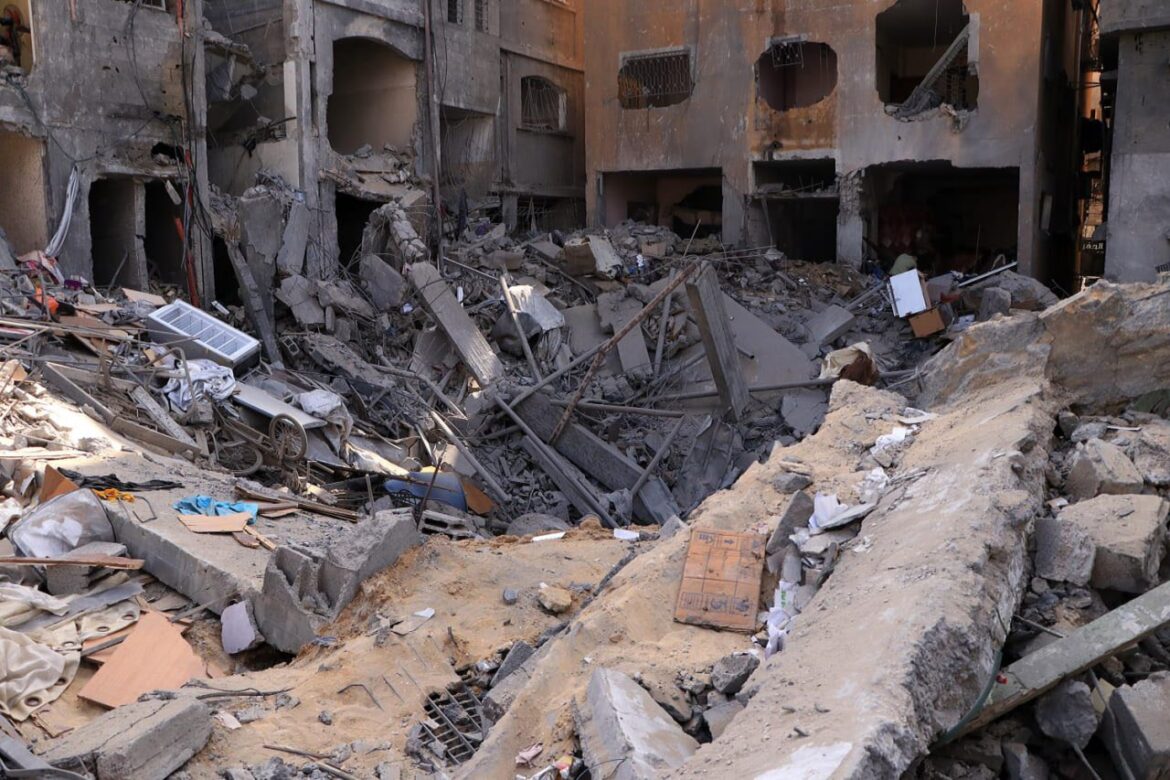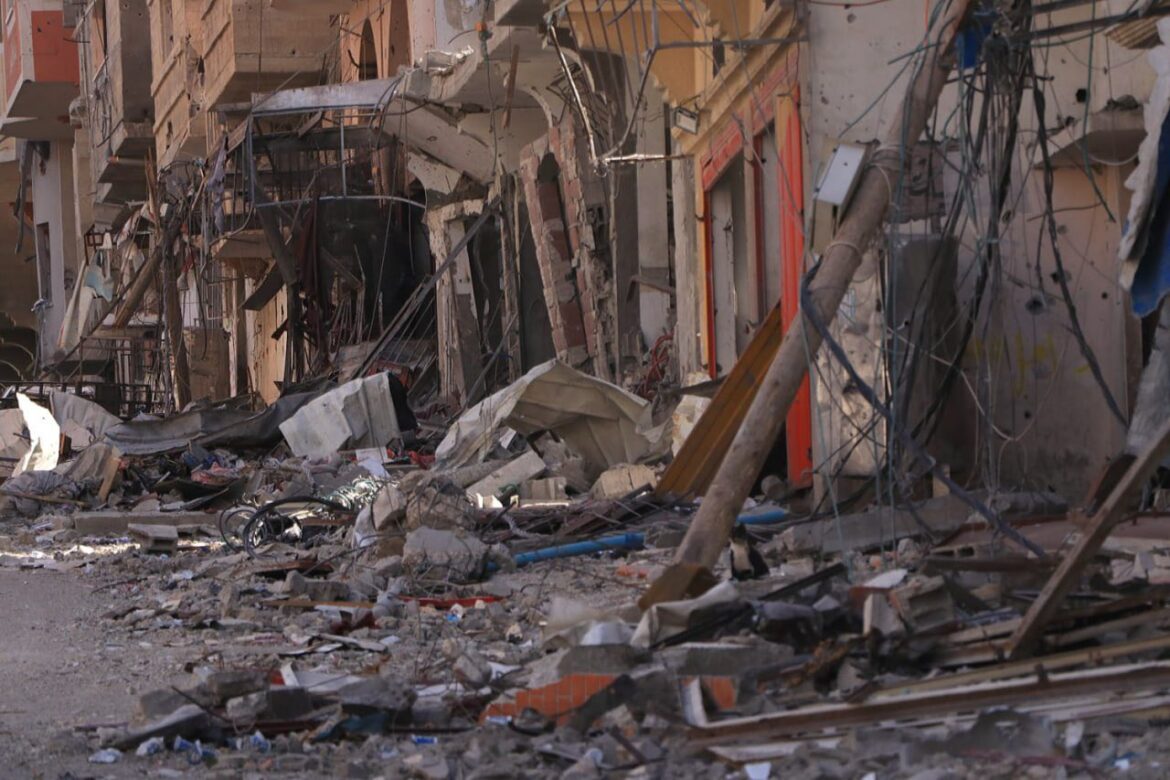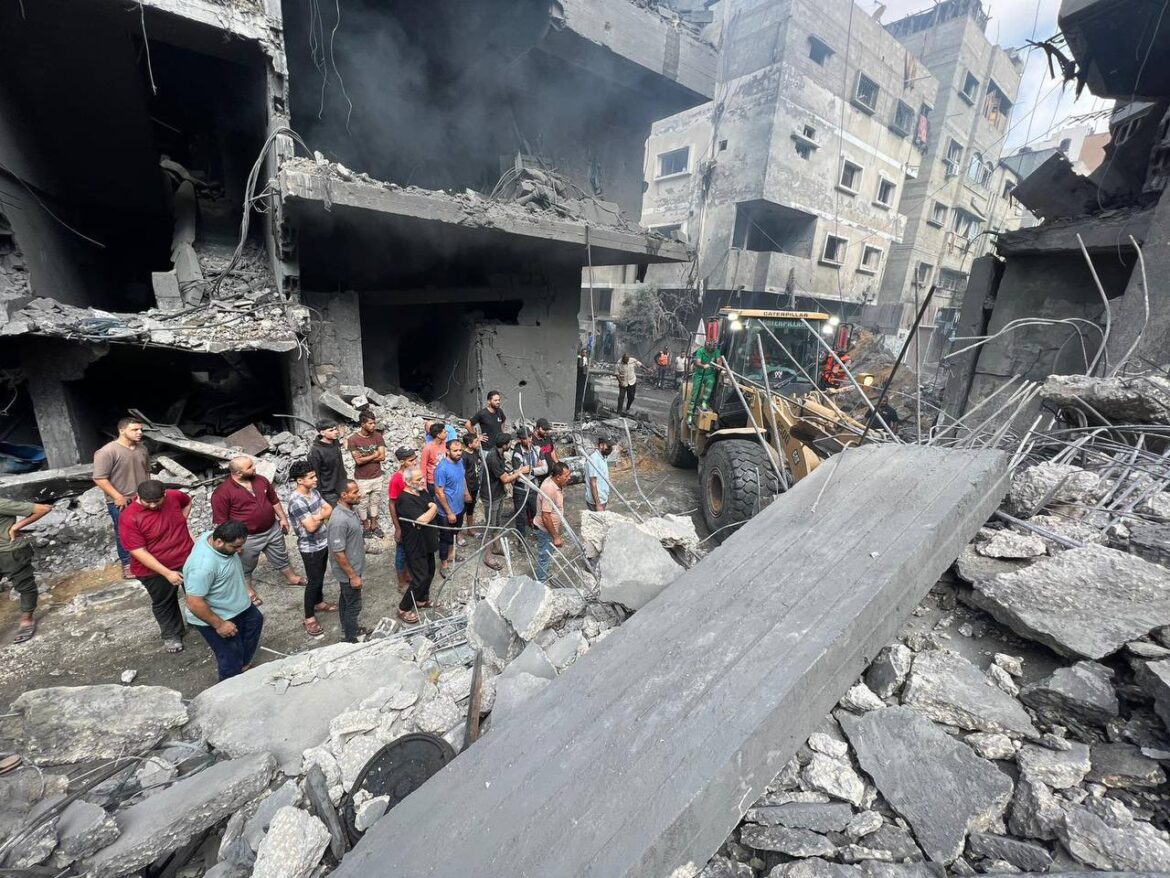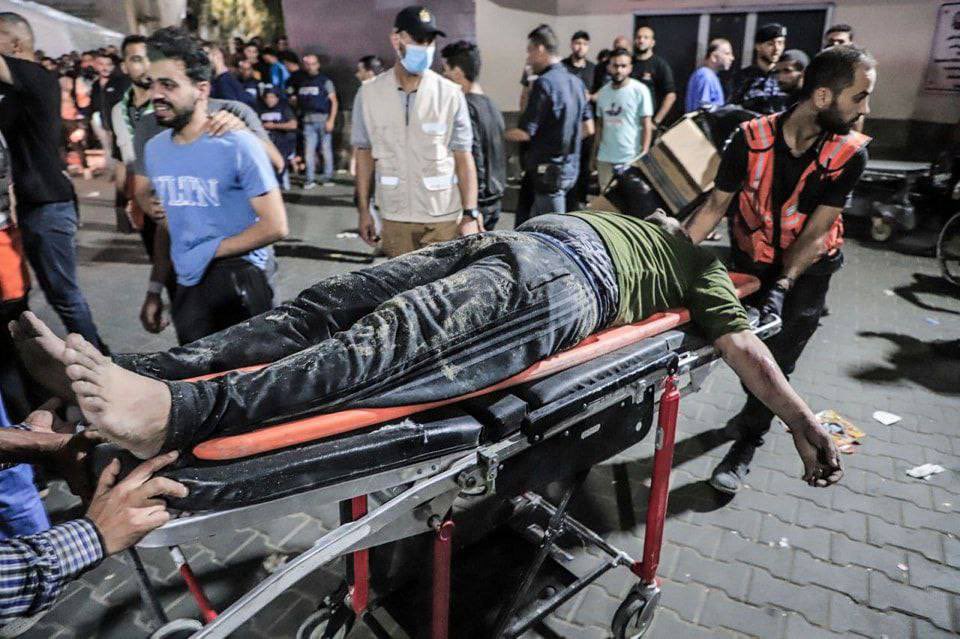A man sits outside a bombed house in Gaza. Half the population of Gaza have been left destitute Photo Twitter/@Timesofgaza
South Africa – “Personally I cried. I’ve been trying to stay away from Al Jazeera news because I didn’t want to see the images and I happened to put it on just as the hospital was struck. I saw those images. I cannot understand it, that the world sits back and allows two things. Firstly, genocide. Deliberate killing of a people by what I think is a Nazi government. A Nazi leadership. That’s what the Israeli government has become. That’s what their leadership has become. You can’t describe it any other way. It’s an Israeli Holocaust.”
The situation in Gaza has reached unprecedented levels of brutality. Genocide, degradation, and despair have become daily realities for the Palestinian population. The Israeli government’s actions have been widely condemned by citizens, with calls for immediate intervention to prevent further loss of innocent lives. However, world leaders and bodies, particularly the United Nations, have failed to do the same and must do more in order to end this Israeli Holocaust, said Donovan Williams, International Relations Expert.
“The United Nations must send a peacekeeping force. It’s not just about humanitarian aid. It’s about putting a peacekeeping force to protect Palestinians from a looming genocide by one of the most equipped armies in the world. This cannot go on because what happens after this episode? What happens to Palestinians after this? Since October 7th, one Palestinian child has been killed a day and since this year, 100 Palestinians have been killed a day. This cannot go on.”
South Africa, having emerged from the inhumane Apartheid system, possesses a unique perspective on the current Israeli genocide. Many South Africans draw parallels between their own history and the plight of the Palestinians. The government’s stance, although supportive of Palestine, has faced criticism for not taking more assertive measures against Israel, said Abeedah Adams, General Industries Workers Union Of South Africa secretary in the Western Cape.
“There are some things the government is doing right but mostly they have also been letting down the Palestinian people. We should not forget that. There are things that our government can do, that we’ve been asking them to do. To cut diplomatic ties with Israel. We don’t want them to downgrade the embassy. South Africa should have no diplomatic ties with the Zionist, Nazi state of Israel and that is something that the ANC and the government has consistently failed in doing. We have been asking our government to support the campaign for Boycott, Divestments and Sanctions against the Israeli state. Those would be important things.”
During the Apartheid struggle, the international community did the same against South Africa. The boycott and isolation of South Africa helped to bring an end to Apartheid. Boycotting and cutting ties with Israel is not the only thing the government needs to do.
“There’s also the issue of prosecuting South Africans who serve in the Israeli occupation Force as well as South Africans who are making that possible, facilitating that and raising funds for this. We’ve got an act actually (Regulation of Foreign Military Assistance Act 15 of 1998). There are more things that the government can do.”
Political divides and media narratives
While the ANC and the EFF support Palestine, there are other parties that don’t like the Patriotic Alliance and the Democratic Alliance who stand firmly behind Israel. The statements of support for Israel coming from those who witnessed Apartheid first hand is quite disappointing and Adams believes one of the reasons for this backing could be for monetary reasons.
The media landscape is also polarised, with disinformation campaigns muddying the waters. From the stories of the 40 beheaded babies to portraying Israel as a victim, major news outlets have gone out of their way to show, indirectly, their support for Israel. Those who support Palestine are met with criticism and even death threats.
“The Anglican Church here in Cape Town has been subjected to a lot of hate mail because the Anglican Church I think about two to three weeks ago, they made a statement to also declare Israel an Apartheid state. There’s also this level of arrogance from the Zionist because the international community has by and large supported them by either ignoring and openly supporting them. We heard Biden saying he’s going to give $8 billion more in aid to the Israeli state. Israel has got the seventh largest army in the world. There’s this level of arrogance and level of impunity that the Zionist state has.”
Kim Heller, Independent Political Analyst, who describes her as a “white settler in South Africa” and comes from a Jewish family, feels ashamed of the Jewish people in Israel for creating a “secular colonialism”. While others might call this a conflict, Heller does not. It is a war that continues the ideology of white supremacy. A war the media seems to be forgetting has a long and brutal history.
“This recent war is a continuation of white supremacy and settler colonialism and the great horrors of that. What I’ve seen as a writer and as a political activist is the almost demystifying or the degrading of what’s happening now or the decontextualization as if this episode started last Saturday when it has got a long and brutal history. It’s being told in the absence of the great suffering of the Palestinian people. Think that that’s almost part of the propaganda. It’s almost as if the decontextualization is a hidden part of propaganda but it’s more dangerous. It presents to the public who the villain is and who the victim is.”
Journalists are also being targeted for showing a Pro-Palestine stance. Six BBC reporters have been taken off air in the Middle East after liking posts showing support for Palestine. While veteran cartoonist Steve Bell, who has been working for the Guardian for the past 40 years, has been told his contract will not be renewed after he complained on Twitter/X about his cartoon featuring Israeli prime minister Benjamin Netanyahu being pulled.
Picking the side of justice
There are those who have decided to remain neutral or even slight on the matter. Finding it hard to pick a side but for Tahir Maepa, General Secretary of the The Public Service Commercial Union of SA (PSCU), it is not about picking Palestine or picking Israel. It is about picking and standing on the side of justice. When you look at what is happening, it is clear and easy to see who is being oppressed and who is the oppressor.
“We’re dealing with a simple straightforward calamity of one group of people dispossessed of their land, their country and been killed daily without fail for over 70 years by one set or group of people who crawled from Europe and the United States suffering from prosecution. Something that they should have learned from. We must say that this is not a Jewish-Arab or Muslim-Jewish conflict. This is a conflict between evil and good. These are the people who are war mongers, who have supported every war that ever existed since the beginning of the history of the world. These people have been behind every genocide, every massacre because to them it’s not about who dies or who lives. It’s about power. Sadly, we find ourselves in a situation where we ordinary people across the globe and even in South Africa, are made to believe that we need to take a side. There’s no side to take here. There’s only one side and the only side that is deprived is the side of the Palestinians.”
Challenging the narrative being played out by major news outlets, Maepa questioned why everybody is so focused on the October attacks by Hamas but not what happened before these attacks.
“Israel has been killing the Palestinians on a daily basis. When the settlers entered the precinct of Al Aqsa and burned one of the oldest historic buildings, which is a heritage site which by any definition requires these people to be charged by the International Criminal Court which will never happen because of the certain people that are beyond reproach. To see people like Biden going to Israel and saying that we are going to give Israel more money and more weapons but anyone who dares to say that we are going to support Palestine, even with food, has been rendered a terrorist or a supporter of terrorism. It is that fear that has put the whole world in a corner.”
South Africans faced these same percussions. Driven from their land, from their houses and treated like third class citizens. South Africans understand this very well but it seems South African politicians are driven by money and “are immoral and have no regard for us or for the people of this country”.
“All that they care about is for their own individual survival and maybe we should be grateful that these people are coming out now so that those of us who will be electing the new leadership of this country next year, we know exactly the kind of devilish people that we are dealing with.”
South Africa needs to stand firm and demand those who deny Apartheid is happening, support the oppressor “cannot set their foot into this country”.
SMread: Bombs rain on Gaza while UK and US block UN resolution
The power of the people
While there has been a noticeable increase in the global support for Israel, with as many as 84 countries openly expressing their endorsement, the power of the people must not be underestimated. While countries and governments continue to support Israel, as long as its citizens rise up and make their voices heard for Palestine, things can change, said Williams.
“The large economies in the world, the United States and the UK, which were the largest trading partners of Apartheid [South Africa] did not have sanctions for most of the time. They were forced into sanctions much later. The reason they were forced to was because their people on the ground … weren’t buying South African Goods. Trade unions were refusing to offload South African goods. We would expect that here in South Africa. We shouldn’t be talking just about the government … what we fail to do as South Africans, we fail to stand up on our own and expect the government or someone else to do it. This is a human rights issue. You can’t carpet bomb Soweto because that’s essentially what’s happening.”
Williams called for South Africans to boycott companies that support Israel and not expect the government to do it. There doesn’t need to be a law to boycott companies. The real action starts when people boycott their favourite stores and stop being “keyboard warriors”.
“We are so angry and so forth but when you’re asked to do something, you find it difficult to do and that concerns me and it should concern all of us. This shouldn’t be a party political matter, it shouldn’t but we make it that. We make it that way because we forget about it at voting time … South Africa can be a progressive country if its people are progressive, not its government. Its government is secondary. Its people must show its progressiveness.”
The disparity in human lives
While this genocide is carrying on, one that is on show is selective empathy. Empathy shown for the Israeli lives lost but none for the Palestinians from media outlets and governments. It comes down to the “essence that some lives are more important than others,” said Heller.
“What we’re seeing is Muslim and Palestinian life is far less important. Somebody should do a study between the Ukraine-Russia situation and what’s happening now. We’ve got exactly the same situation where the villains are being seen as victims. That just shows that overwhelming presence and omnipotence of global media.”
The parallels of Apartheid South Africa and Israel have been shown. The dispossession of land, economic disparity, and systematic oppression are the same. Despite these similarities, the world’s response remains inconsistent. Media outlets play a significant role in perpetuating biases and shaping public opinion.
Human tragedy amidst global celebrations
Joy and despair happen at the same time. While the Israeli genocide takes place, life carries on for us and sometimes we may feel guilty for having moments of joy in our life while Palestininas are being slaughtered ruthlessly. This shouldn’t cause us guilt or sadness but rather drive us to demand change, said Williams.
“I am friends with a number of people from Palestine on Facebook. When South Africa does well they congratulate us, they send us messages. Palestinians love South Africa a lot more than South Africans love Palestinians … When we did well on Sunday night, I would have normally got messages saying well done South Africa. We were cheering for you but they couldn’t do that and I couldn’t expect them to do it. I want South Africans to know, we can still be South Africans and support Palestinians. That there is joy and despair happens at the same time but I want to see South Africans being progressive.”
Instead of having people like Steve Bhiko, who stood against injustice in every way, we have those who are “worried about their next paycheck,” said Heller. We cannot be such people who are scared to stand up against injustice. We must stand strong with the Palestinians as they stood with us while we suffered under the Apartheid government.




